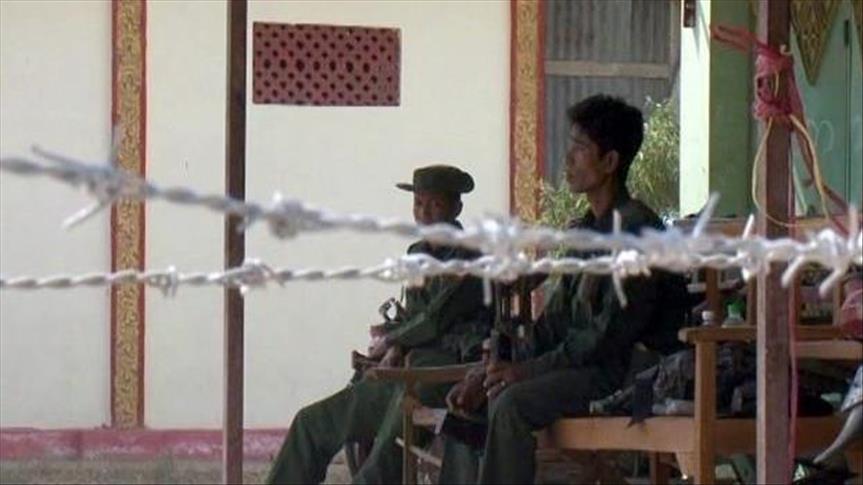Myanmar to prosecute Illegal mosque builders
Religious authority to take legal action against those who constructed mosque on state-own land, and those who destroyed it
 FILE PHOTO
FILE PHOTO
By Kyaw Ye Lynn
YANGON, Myanmar
Myanmar’s religious authority has said it will to take legal action against those who constructed a mosque and other religious buildings on state-own land in the country's north, along with those who later destroyed them.
The mosque is understood to have been built around 1988 after planning requests went unanswered during the chaotic years of nationwide demonstrations in the then junta-ruled country.
On July 5, police detained five people from a 150-strong mob who stormed the building in Hpakant Township in restive Kachin State on July 1 after the Muslim community defied a demolition order issued by local authorities.
Local members of Ma Ba Tha -- a nationalist sect of Buddhists frequently responsible for anti-Muslim rhetoric -- had accused Muslim residents in Le Pyin of building the mosque and other structures in the complex illegally during the construction of a nearby bridge, and threatened June 17 to destroy them unless they were demolished.
The state-run Global New Light of Myanmar newspaper reported Thursday that the Ministry of Religious Affairs and Culture had said in a statement it would act against the individuals who illegally facilitated the construction as well as those involved in the assault.
It added that the Muslim community had illegally used four buildings on state-own land for religious purposes during the two-year construction of the bridge, and they -- including Chief Engineer Sonny Thein -- would face charges in accordance with the law, including the Vacant, Fallow and Virgin Lands Management Law.
On Thursday, Thein Aung, the chairman of the mosque’s caretaker committee, told Anadolu Agency that the land was donated to the Muslim community for religious purposes by a private Muslim owner named Ye Maung, and despite applying for permission again and again no answer was received.
The mosque was eventually constructed in 1988, during the largest countrywide pro-democracy/anti junta demonstrations the country has ever seen.
Hundreds of people are believed to have been killed in the protests -- which began as a student movement and were organised largely at the Rangoon Arts and Sciences University and the Rangoon Institute of Technology -- as the junta brutally cracked down on demonstrations.
“The situation is chaotic at that time. We later tried to apply permission for the mosque several times,” Thein Aung said. “But it always ends up with no answer from authority.”
According to the ministry's statement, however, in 1985 the then chairman of the people’s council, now deceased, transferred ownership of the land to Ye Maung to build a temporary home, but ownership of the plot defaulted back to the state upon his death.
On Thursday, the director of the Ministry of Religion and Culture, Aung San Win, insisted that those who build Buddhist buildings illegally are also ordered to take them down.
“The investigation found the land is state-owned and the buildings were used for religious purpose without official permission,” he told Anadolu Agency by phone. “We take action against those who illegally build religious buildings no matter what their religions are."
The statement said that 24 illegally built Buddhist monasteries in the Nay Pyi Taw Council Area had been knocked down since Feb. 2, 2014 along with 173 illegal monasteries in the Yangon region
It added that a futher 86 illegal monasteries and other religious buildings across the country are currently facing prosecution in accordance with the law.
Since the National League for Democracy's victory in the Nov. 8 election, leader (and now State Counselor) Aung San Suu Kyi has been placed under tremendous international pressure to solve problems faced by the country's Muslim population, but has had to play a careful balancing act for fear of upsetting the country's nationalists, many of whom have accused Muslims of trying to eradicate Buddhist traditions.
Suu Kyi has, however, enforced the notion that many of the issues causing religious tensions in an area at the heart of the problem -- western Rakhine State -- are economic, and is encouraging investment in the area, which in turn her party hopes will lead to reconciliation between the Buddhist and Muslim communities.
Anadolu Agency website contains only a portion of the news stories offered to subscribers in the AA News Broadcasting System (HAS), and in summarized form. Please contact us for subscription options.

